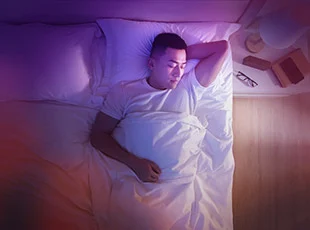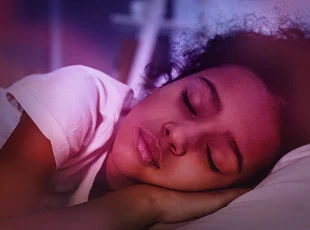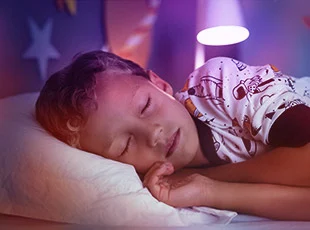Parents know that sleep is important for kids for their growth, learning ability, and general mood,
1 and often find themselves wondering if their kids are getting enough sleep.
Even after trying to instill good sleep habits in their kids, many parents may start to consider a sleep aid or a melatonin supplement if their child still has difficulty sleeping.
If that sounds like you, it's a good idea to educate yourself about melatonin for kids: how melatonin works, what melatonin is, and how safe melatonin is for kids.
Read our article here on everything you need to know about melatonin to determine if it's the right choice for your child.
A melatonin supplement is a great choice for occasional sleeplessness because it’s effective and drug-free.
What is melatonin and what does it do?
Melatonin is a sleep hormone naturally produced by the pineal gland in the brain. It makes your child feel sleepy. When the brain thinks it’s time for bed, it will start increasing the production of this hormone. When the brain thinks it’s time to wake up, it will decrease its melatonin production.
Your child’s brain should produce the right amount of melatonin at the right time. However, there are many scenarios that can disrupt your child's melatonin production and sleep-wake cycle, such as:
Inconsistent bedtimes. The sleep-wake cycle of kids who have very active social lives, cram for tests late at night, sleep in on weekends, or travel frequently for sports or other activities may be impacted by inconsistent bedtimes. According to the Journal of the American Academy of Child & Adolescent Psychiatry2, a melatonin supplement can help reset their sleep-wake cycle so that they can get a great night’s sleep.
Screen time after dark. The light from doing homework on a computer, watching TV, or texting after dark could incorrectly signal to your child’s mind and body that it’s still daytime, resulting in too little melatonin being produced. If screens are unavoidable in the evenings, a melatonin supplement can help mitigate their effects.
Hyperactivity disorders. Regulation of melatonin production in kids with hyperactivity disorders, like ADHD, has been shown to be impaired. While melatonin should not be used to treat ADHD, parents can consult their pediatrician about low-dose melatonin supplements to help their child fall asleep.
While these are just a few common scenarios, there are many more that can disrupt a child’s sleep-wake cycle. A melatonin supplement is a great choice for occasional sleeplessness because it’s effective and drug-free. It’s also non-habit-forming, so it can be used whenever needed. Read more about what melatonin is and how it works here.
Is melatonin safe for kids?
Many parents are hesitant to give their children sleep aids because of worries that they’ll have side effects or that their child will no longer be able to sleep without a sleep aid. Melatonin is a supplement, not a prescription sleep-aid—it won’t cause dependency, so it's a good option if your child has difficulty falling asleep occasionally.
If your child isn’t getting enough sleep consistently, the results can be serious. From social issues to fogginess to lack of coordination during sports, those sleepless nights can add up. If your child is having trouble falling and staying asleep or is showing any of these symptoms, don’t wait, talk to your pediatrician about what you can do for your restless child. Consult your doctor to confirm if melatonin is a good choice for your family.
Melatonin gummies
Melatonin gummies are a great option if your child is having trouble sleeping.
So, if you’re looking for a sleep aid that’s non-habit-forming, drug-free, and made especially for kids, talk to your pediatrician about including a melatonin supplement in your child’s bedtime routine. Check out our article here for more tips on how to help your kids sleep better.







